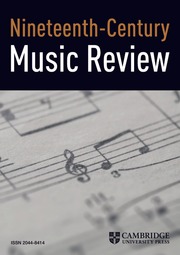No CrossRef data available.
Article contents
The Enchantress and Problems of Pacing in the Operas of Tchaikovsky: An Informal Interview with David Lloyd-Jones
Published online by Cambridge University Press: 13 April 2011
Extract
In June and July of 2004, Grange Park Opera gave the first professional stage performances in the United Kingdom of Tchaikovsky's The Enchantress (Charodeyka). David Lloyd-Jones conducted and was responsible for the performing version. The following article is based on an interview with him taped between the sixth and seventh performances.
A retired Syracuse University music librarian, is the author of two published Tchaikovky studies: ‘The Tchaikovsky Fifth: a symphony without a programme’ (1991) and, in collaboration with Mark Elder, ‘The Dramaturgy of Tchaikovsky's Mazeppa’ (1988). He was for many years a contributor of record reviews and interviews to Fanfare magazine.
- Type
- Articles
- Information
- Copyright
- Copyright © Cambridge University Press 2007
References
1 Tchaikovsky, The Sorceress. Nastasia, N. Sokolova; Prince Nikita, M. Kiselev; Princess Evpraksia, V. Borisenko; Prince Uri, G. Nelepp; Mamyrov, A. Korolev; Samuel Samosud cond., Russian Radio Chorus, Moscow Philharmonic Orchestra. Parlophone PMA 1029-32 (1958). UK reissue of Melodiya 3002-09 (1956).
2 Abraham, Gerald, ‘Operas and Incidental Music’, in Tchaikovsky: a Symposium, ed. Abraham, Gerald (London: Lindsay Drummond, 1945): 124–83Google Scholar . Abraham's observations on The Enchantress, translated as The Sorceress, are on pp. 166–71.
3 ‘Un poco di Chopin’ op. 72, no. 15.
4 Act II, no. 13, bar 1 et sec.
5 Act II, no. 9, bar 77 et sec.
6 Act II, no. 13, bar 133 et sec.
7 Act I, no. 7, bar 1 et sec.
8 Strauss, Richard, commenting on the suite from Rimsky-Korsakov's Christmas Eve, observed, ‘It's charming, but sadly we aren’t children any longer’.Google Scholar Translation by Taruskin, Richard, ‘Rimsky-Korsakov’, The New Grove Dictionary of Opera (New York: Grove's Dictionaries of Music, 1992): vol. 3, 1337Google Scholar.
9 Act II, no. 12, bars 22–25.
10 Act II, no. 14, bars 1-4.
11 Act II, no. 14, bars 61–65.
12 The reference here is to Debussy's piano piece of the same title, no. 3 of his Suite bergamasque.
13 Act IV, no. 19, bars 64–65 et sec.
14 Mazeppa, Act I, no. 8, bar 180 (Allegro moderato con brio) to end of act.
15 One of the most cordial reviews was by Clements, Andrew in the Guardian (London) (12 June 2004).Google Scholar ‘While it's easy to understand why [The Enchantress] has been neglected, the increasingly implausible plot and grande guignol finale carry with them some astonishing, full-blooded music, in which Tchaikovsky's melodic invention is at full throttle. Grange Park certainly does the piece proud, squeezing every drop of musical and dramatic intensity out of the creaky scenario… The conductor, David Lloyd-Jones, drives home that slightly unbelievable denouement as assuredly as he paces every bar of the opera and shepherds the carefully selected cast and the superbly drilled chorus very carefully through what is a demanding score – It is all a hugely enjoyable, theatrically stirring evening.’ Other enthusiastic reviews appeared in the Financial Times (12 June); The Independent (14 June); The Stage (17 June); and Opera (London) (Sep.). The critic for the Daily Telegraph (16 June) praised the production but not the opera, while the critic for The Times (London) (15 June) praised the opera, not the production.


